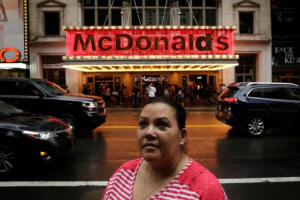|
Not so fast: U.S. restaurant workers seek
ban on surprise scheduling
 Send a link to a friend
Send a link to a friend
 [July 17, 2017]
By Peter Szekely [July 17, 2017]
By Peter Szekely
NEW YORK (Reuters) - The text message came
as Flavia Cabral walked to a McDonald's restaurant in Manhattan for her
6 p.m. shift on a May evening. It was from her manager. Business was
slow and she was not needed.
Cabral said she was not too surprised. Her work hours fluctuate almost
weekly, though losing an entire shift at the last minute happens only
once every few months. This time the canceled shift took a $63 bite out
of her average $350 gross weekly earnings from two part-time jobs.
"Every week you're guessing how much money you're going to get and how
many days you're going to work," said Cabral, 53, who has been employed
at McDonald's for four years.But a measure of relief is coming for
Cabral and 65,000 other New York City fast-food workers whose schedules
and incomes often change with little or no notice.
New York recently became the largest U.S. city to require fast-food
restaurants to schedule workers at least two weeks in advance, or pay
them extra for changes.

The law, which the restaurant industry vigorously opposed, also requires
employers to allow 11-hour breaks between shifts, offer part-time staff
additional work before hiring new employees, and pay retail workers to
be "on call." It takes effect late this year.
McDonald's Corp did not respond to a request for comment.
Nationwide, the issue of scheduling is becoming a new battleground in
the fight to boost living standards for low-paid workers, waged largely
by the "Fight for $15" movement. The five-year-old, union-backed
initiative has already helped convince many jurisdictions, including New
York state, to raise minimum wages.
In Oregon, a bill that would set regular scheduling for workers at large
food service, hospitality and retail companies is awaiting the
governor's signature. Similar bills are pending in five other states.
Not only do fluctuating schedules wreak havoc with tight household
budgets, they make it difficult to make appointments, arrange child care
and plan family time, workers point out.
The restaurant industry vigorously opposed the New York City law.
Combined with higher minimum wages, scheduling requirements will
eventually cripple some fast-food outlets, which mostly operate on thin
profit margins of 1.5 to 3 percent, it says.

With a business model based on offering workers entry-level
opportunities, not living wages, fast-food restaurants need flexible
scheduling to survive, said industry advocate Louis Meyer, who runs
fast-food operations at New Jersey-based Briad Group.
"There's no way you can stay in business," said Meyer, whose company
employs 1,000 workers at about two dozen franchised Wendy's and TGI
Friday's in New York. "It's like having a disease. It's going to get you
sooner or later."
[to top of second column] |

Flavia Cabral, a McDonald's employee, poses for a portrait in New
York City, U.S., July 14, 2017. REUTERS/Lucas Jackson

Workers at McDonald's, whose restaurants are mostly franchised, said
weekly schedules are usually posted a day or two before they take
effect. Still, they say they are often told at the last minute not
to come to work or to punch out early.
"You could only have been on the clock for two hours and they'll
tell you to go home," said Ashley Bruce, 22, who has worked for four
years at a McDonald's on Chicago's South Side. The Chicago City
Council is considering a scheduling bill that would cover 450,000
hourly workers.
Variable scheduling began cropping up in the 1970s as companies
sought to maximize profits to better attract investors, according to
University of Chicago Associate Professor Susan Lambert, who studies
scheduling practices.
"They're really looking at those labor budgets," she said. "So, that
puts enormous pressure on managers to really keep close track of how
many hours you're using and how sales are going."
Some use sophisticated "workforce optimization systems" to analyze
sales, weather and other factors to determine how few workers they
need to remain profitable at a given moment, Lambert said.
Although fluctuating schedules affect mostly lower paid workers, it
is a management strategy that is starting to affect higher paid jobs
as well, as companies seek to transfer the risk of unsteady revenue
to their employees.

The New York City scheduling law was passed with strong support from
unions, including Local 32BJ of the Service Employees International
Union, even though almost all fast-food workers are not unionized.
But Local 32BJ President Hector Figueroa said winning scheduling
rights for fast-food workers also helps his union's 90,000 building
service workers.
"Our members enjoy these rights under the contract," he said. "But
if other workers don't enjoy them, it's just a matter of time for an
employer in a building or in a cleaning company to say, 'Wait a
minute, why do you guys need advance notice of scheduling?'"
(Reporting by Peter Szekely; Editing by Lisa Shumaker)
[© 2017 Thomson Reuters. All rights
reserved.]
Copyright 2017 Reuters. All rights reserved. This material may not be published,
broadcast, rewritten or redistributed.
 |